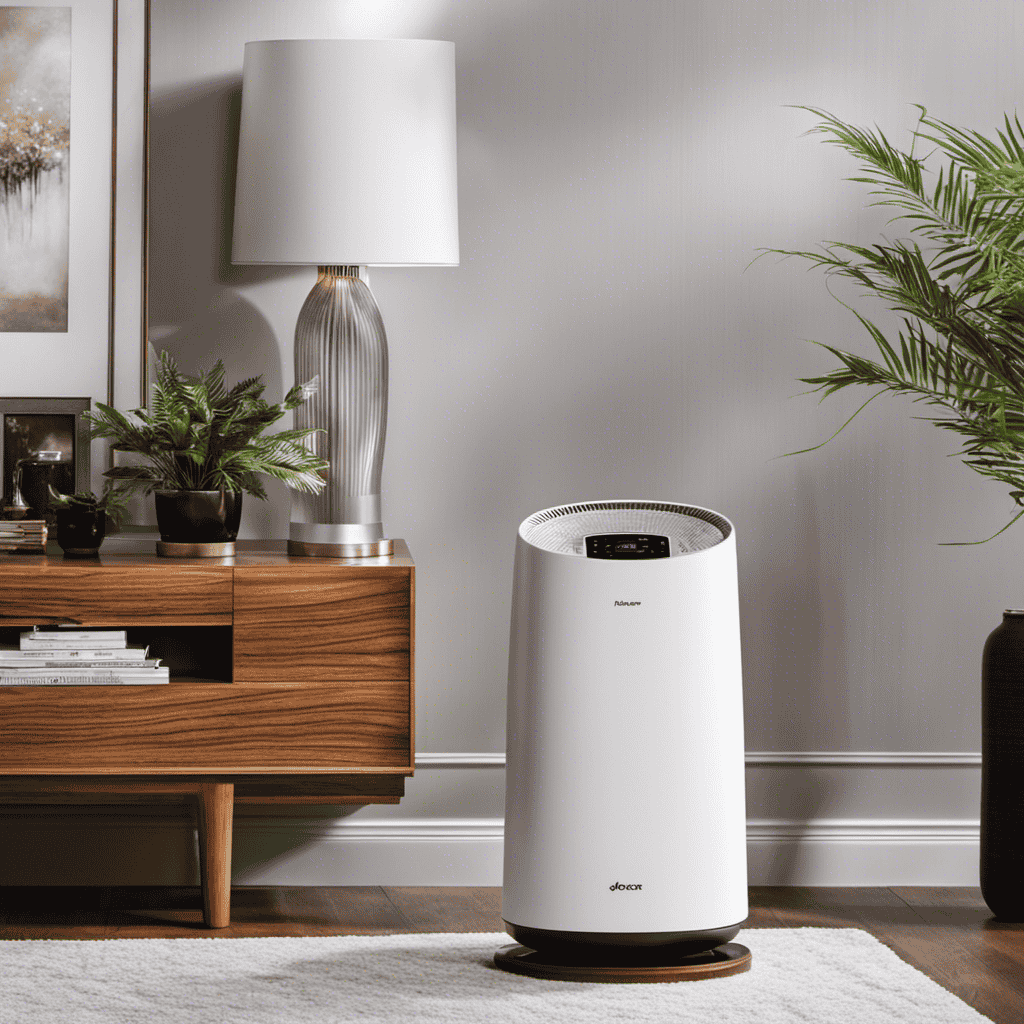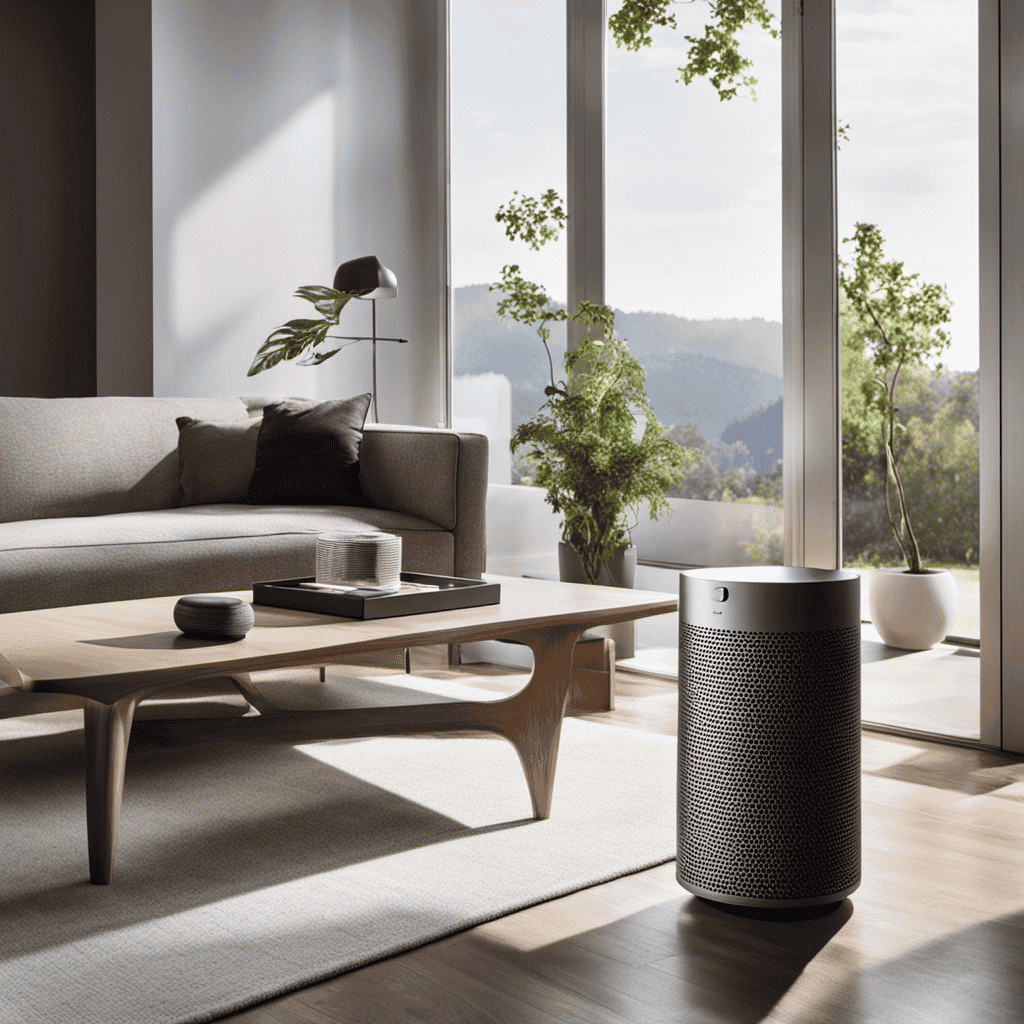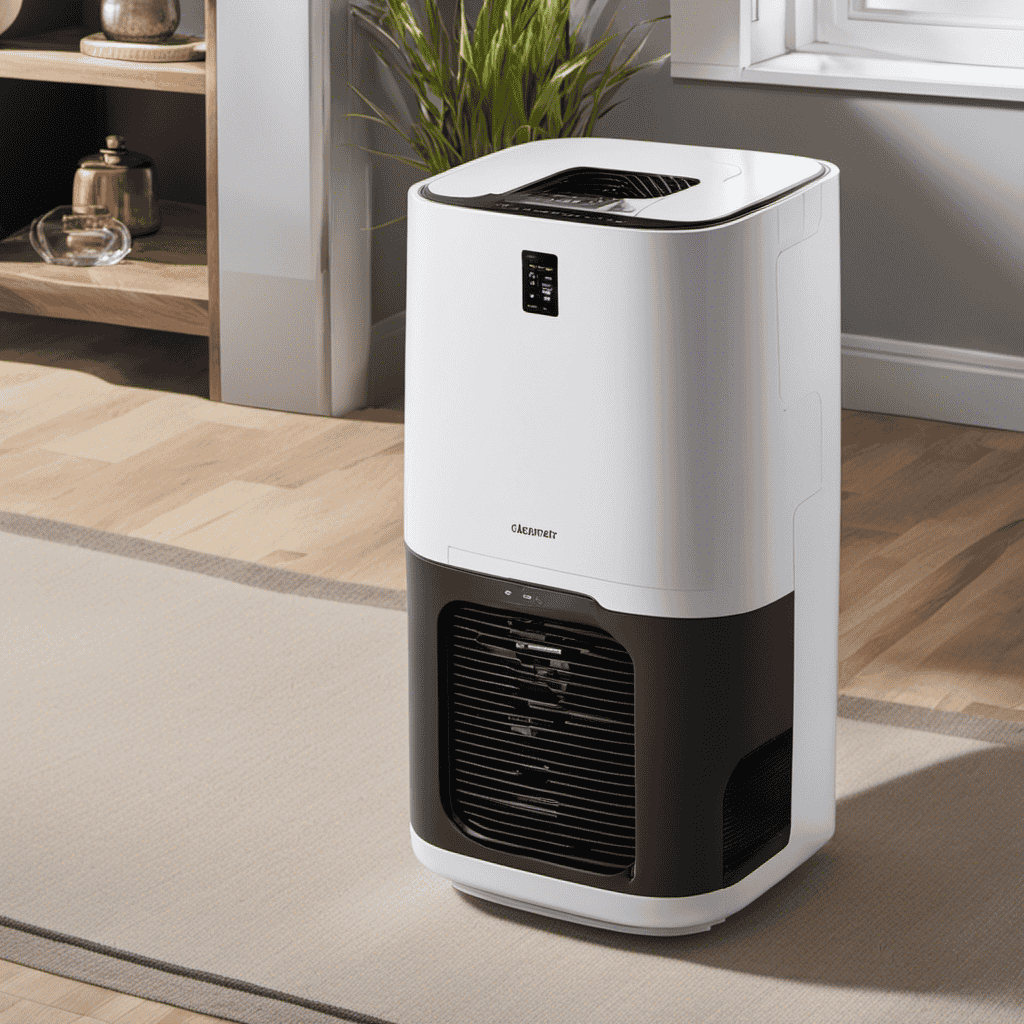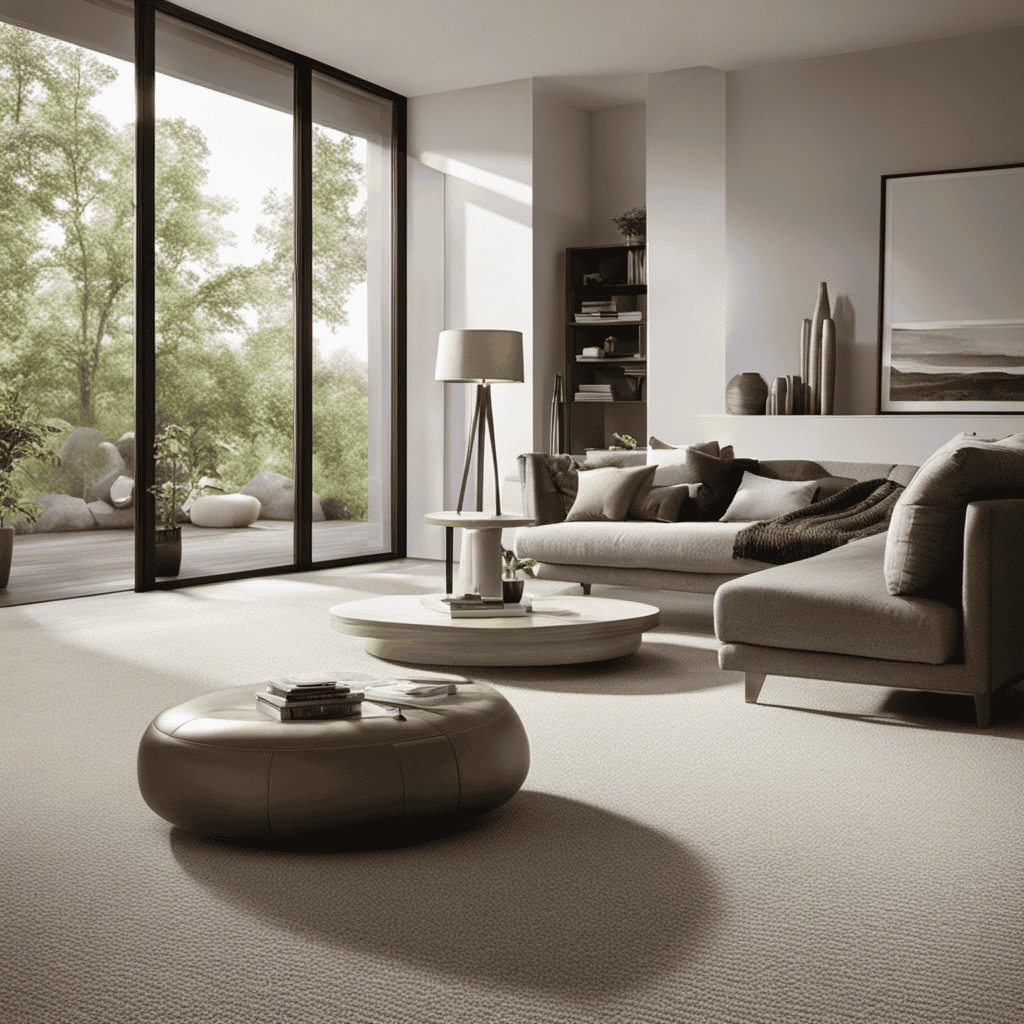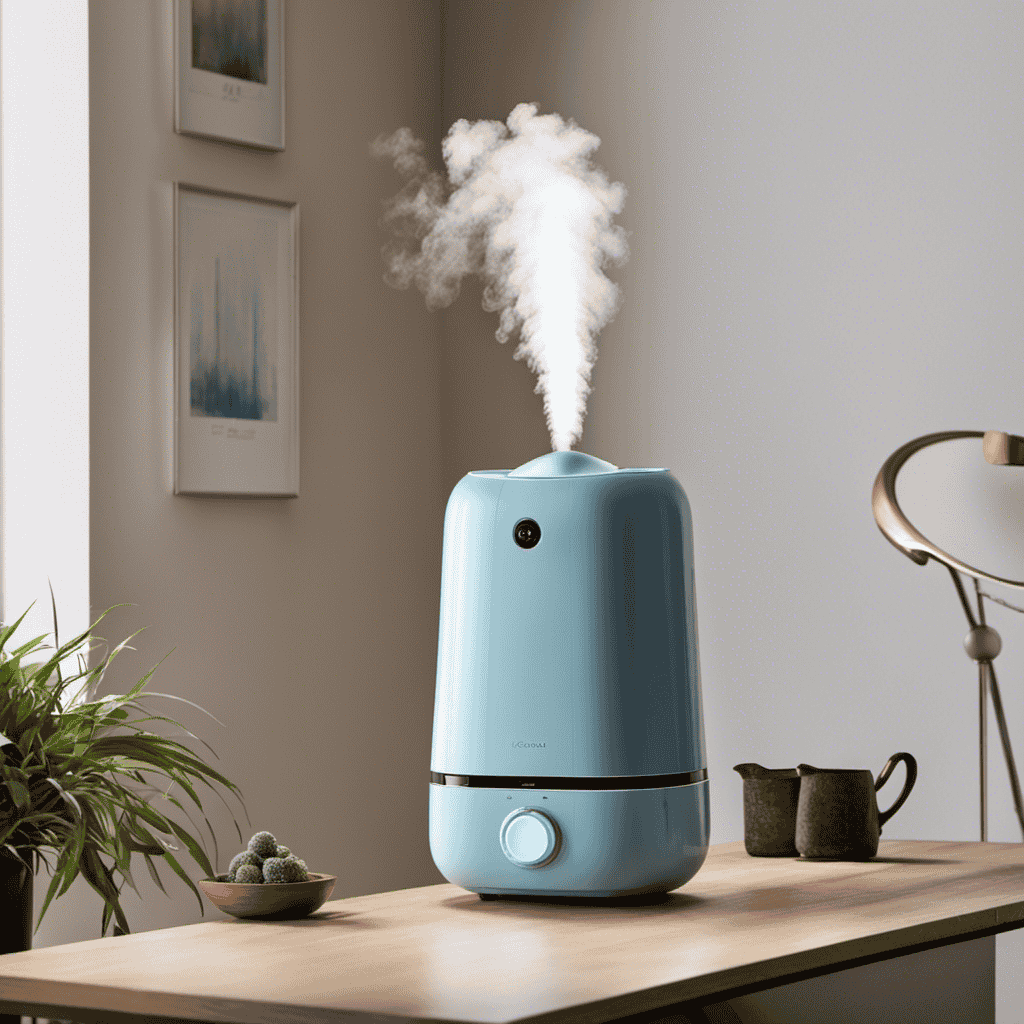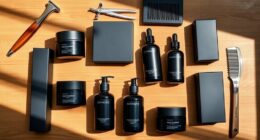Upon entering my residence, I pause to inhale deeply, longing for a breath of fresh, clean air. However, what if the air inside our home is contaminated with unseen particles and pollutants?
This is where an ionizer air purifier comes to the rescue. By harnessing the power of negative ions, these devices work tirelessly to eliminate harmful contaminants, leaving behind a healthier environment.
In this article, I will dive into the workings, benefits, and key features of ionizer air purifiers, helping you make an informed decision.
Key Takeaways
- Ionizer air purifiers release negatively charged ions into the air.
- Negative ions attach to positively charged particles, causing them to become heavier and fall to the ground or stick to surfaces.
- Ionizer air purifiers effectively capture and neutralize allergens and pollutants, improving indoor air quality.
- Using an ionizer air purifier can lead to reduced allergies, improved respiratory health, and better overall quality of life.
How Does an Ionizer Air Purifier Work
To understand how an ionizer air purifier works, you need to know that it releases negatively charged ions into the air.
Negative ionizers are a type of ionizer air purifier technology that helps improve air quality by removing pollutants and allergens from the air.
These devices work by emitting negatively charged ions, which attach themselves to positively charged particles in the air, such as dust, smoke, and pollen.
This process causes the particles to become heavier and fall to the ground or stick to surfaces, effectively removing them from the air you breathe.
Additionally, negative ions can also help neutralize harmful substances like bacteria and viruses.
Ionizer air purifier technologies have proven to be effective in reducing airborne pollutants and improving indoor air quality, making them a popular choice for those with allergies or respiratory issues.
Benefits of Using an Ionizer Air Purifier
In my experience with using an ionizer air purifier, I have found that it provides significant improvements in indoor air quality.
The ionization process helps to remove harmful particles and pollutants from the air, resulting in a cleaner and healthier environment.
Additionally, the allergen reduction capabilities of an ionizer air purifier are impressive, as it effectively captures and neutralizes allergens such as dust, pollen, and pet dander.
Lastly, the odor elimination effectiveness of an ionizer air purifier is noteworthy, as it helps to eliminate unpleasant odors caused by cooking, pets, or smoke.
Improved Indoor Air Quality
Using an ionizer air purifier can help improve indoor air quality. Indoor pollution sources, such as dust, pet dander, and volatile organic compounds (VOCs), can negatively affect the air we breathe, leading to various health issues.
Clean air is essential for maintaining good health and well-being. By using an ionizer air purifier, these harmful pollutants are effectively removed from the air, resulting in cleaner and fresher indoor environments. Ionizers work by releasing negative ions that attach to airborne particles, causing them to become too heavy to remain in the air and fall to the ground.
This process helps to reduce the concentration of pollutants, leading to improved air quality. With cleaner air, individuals can experience the benefits of reduced allergies, improved respiratory health, and overall better quality of life.
Transitioning to the next section, let’s explore the allergen reduction capabilities of ionizer air purifiers.
Allergen Reduction Capabilities
Reducing allergens is crucial for improving indoor air quality and promoting better respiratory health. One effective way to achieve this is by using air purifiers equipped with advanced technologies. These devices are designed to capture and eliminate various airborne allergens, such as dust mites, pollen, pet dander, and mold spores. By incorporating multiple filtration systems, air purifiers can trap even the smallest particles, ensuring cleaner and healthier air. Regular maintenance of air purifiers is essential to ensure optimal performance. This includes cleaning or replacing filters, checking the device for any signs of damage, and following the manufacturer’s instructions. By utilizing air purifier technologies and practicing proper maintenance, individuals can significantly reduce allergens in their indoor environment, leading to improved respiratory health and overall well-being.
Table:
| Air Purifier Technologies | Allergens Removed |
|---|---|
| HEPA Filters | Dust mites, pollen, pet dander |
| Activated Carbon Filters | Smoke, odors, chemical pollutants |
| UV-C Light | Bacteria, viruses, mold spores |
| Ionizers | Allergens, such as pollen and pet dander |
Odor Elimination Effectiveness
The odor elimination effectiveness of air purifiers can be enhanced with activated carbon filters. These filters are designed to trap and remove odors from the air, including those caused by airborne bacteria and pet dander.
Activated carbon is a highly porous material that has a large surface area, allowing it to effectively adsorb and trap odor molecules. When air passes through the purifier, the activated carbon filter captures the odorous particles, preventing them from recirculating back into the room.
This not only helps to eliminate unpleasant smells but also reduces the presence of airborne bacteria and pet dander, improving the overall air quality. Activated carbon filters are a valuable addition to any air purifier, providing an extra layer of odor elimination and enhancing the purifier’s effectiveness in creating a clean and fresh indoor environment.
Key Features to Look for in an Ionizer Air Purifier
When it comes to air purification, it’s important to understand the various ionization technologies available.
These technologies play a crucial role in removing pollutants and allergens from the air, ensuring a healthier and cleaner environment.
In this discussion, we’ll explore the benefits of using ionization technologies in air purification systems. We’ll highlight their effectiveness in improving indoor air quality and promoting overall well-being.
Important Ionization Technologies
You should consider the important ionization technologies used in ionizer air purifiers. These technologies play a crucial role in removing airborne pollutants and improving indoor air quality.
Here are two key ionization technologies to look for:
-
Electrostatic Precipitation: This technology uses an electric charge to remove particles from the air. It works by charging the particles and then attracting them to oppositely charged plates or filters. This process effectively captures pollutants like dust, pollen, and smoke.
-
Needlepoint Bipolar Ionization (NPBI): NPBI technology releases positive and negative ions into the air. These ions attach to particles, pathogens, and volatile organic compounds (VOCs), causing them to cluster together and become larger. As a result, they are easier to capture by air filters or fall to the ground, reducing their presence in the air.
Benefits of Air Purification
Consider the benefits of having clean and purified indoor air. When it comes to improving sleep and reducing respiratory symptoms, air purification plays a crucial role.
Breathing in clean air while sleeping can lead to a more restful and rejuvenating sleep. Studies have shown that poor indoor air quality can disrupt sleep patterns and contribute to sleep disorders such as insomnia and sleep apnea.
By removing pollutants, allergens, and irritants from the air, air purifiers create a healthier sleep environment. Additionally, air purifiers can help reduce respiratory symptoms such as coughing, sneezing, and wheezing. They remove airborne particles that can trigger allergies and asthma, providing relief for those with respiratory conditions.
Investing in an air purifier can greatly improve both the quality of your sleep and your overall respiratory health.
Understanding Negative Ions in Ionizer Air Purifiers
To fully comprehend the benefits of ionizer air purifiers, it’s important to understand how negative ions function. Negative ions are oxygen atoms with an extra electron. When they are released into the air by ionizer technology, they attach themselves to airborne pollutants like dust, pollen, and smoke. This process causes the pollutants to become too heavy to remain in the air, causing them to fall to the ground or be captured by surfaces in the room.
Negative ions also have a positive effect on our health and well-being. They are believed to increase the flow of oxygen to the brain, resulting in improved alertness and mental clarity. Additionally, negative ions have been shown to reduce the presence of harmful bacteria and viruses in the air, helping to prevent the spread of illnesses.
With a proper understanding of negative ions and their benefits, we can now move on to comparing ionizer air purifiers with HEPA filters in the next section.
Comparing Ionizer Air Purifiers and HEPA Filters
When it comes to air purification, two common options are ionizers and HEPA filters.
Ionizers use negative ions to attract and remove particles from the air, while HEPA filters physically trap particles.
In terms of air purification effectiveness, studies have shown that both ionizers and HEPA filters can effectively remove pollutants, but HEPA filters are generally more efficient at capturing smaller particles.
Additionally, when comparing the health benefits of ionizers and HEPA filters, it is important to consider individual sensitivities and preferences.
Some people may prefer the fresh scent of ionizers while others may prefer the odorless filtration of HEPA filters.
Ionizers Vs. HEPA Filters
Ionizers and HEPA filters work differently to clean the air in your home. Ionizer air purifiers release negatively charged ions into the air, which attach to airborne particles and make them fall to the ground or stick to surfaces. On the other hand, HEPA filters trap particles in a dense filter material, effectively removing them from the air.
When comparing ionizer air purifiers to activated carbon filters, there are some pros and cons to consider.
Pros of ionizer air purifiers:
- They can effectively remove certain pollutants, such as pollen and pet dander.
- They can help reduce odors in the air.
Cons of ionizer air purifiers:
- They produce ozone, which can be harmful to human health in high concentrations.
- They may not be as effective at removing smaller particles or harmful gases.
Ultimately, the choice between ionizer air purifiers and activated carbon filters depends on your specific needs and concerns.
Air Purification Effectiveness
HEPA filters are known for their effectiveness in trapping particles in the air. However, there are other air purification techniques, such as ionization, that claim to be equally effective or even more so. But how do they really compare?
To understand the effectiveness of ionization, let’s take a look at a comparison between HEPA filters and ionizers:
| HEPA Filters | Ionizers | |
|---|---|---|
| Method | Physical | Chemical |
| Trapping | Particles | Particles, bacteria, and viruses |
| Efficiency | High | Variable, depends on the model |
| Maintenance | Regular filter replacement | Cleaning the plates or grids |
| Ozone production | Negligible | Variable, some models produce ozone |
While HEPA filters have proven to be highly effective in trapping particles, ionizers offer a different approach. They release negatively charged ions into the air, which attach to particles and cause them to settle. However, the effectiveness of ionizers can vary depending on the model and the size of particles.
It is important to note that ionizers can also produce ozone, which can be harmful to human health. Therefore, it is crucial to choose an ionizer that produces minimal ozone levels.
Health Benefits Comparison
Although the health benefits of both methods vary, it is important to consider the effectiveness and potential risks of each. When comparing the health benefits of ionizer air purifiers and traditional air purifiers, there are several factors to consider:
-
Ionizer Air Purifiers:
-
They release negative ions into the air, which attach to airborne particles and make them too heavy to remain suspended. This helps to remove pollutants from the air.
-
Some studies have shown that negative ions can improve mood and reduce symptoms of depression and anxiety.
-
Traditional Air Purifiers:
-
They use filters to trap airborne particles, including dust, pollen, and pet dander. This can help to reduce allergies and asthma symptoms.
-
Traditional air purifiers are also effective at removing odors and harmful chemicals from the air.
In terms of cost comparison, traditional air purifiers are typically more expensive upfront, as they require replacement filters. However, ionizer air purifiers may consume more electricity in the long run, making them less energy efficient. It is important to consider both the cost and energy efficiency when choosing between the two options.
Common Myths About Ionizer Air Purifiers Debunked
One of the most prevalent myths about ionizer air purifiers is that they produce harmful ozone. However, this is not entirely true.
While it is true that ionizer air purifiers do produce ozone, the levels are usually within safe limits and do not pose a threat to human health.
In fact, ionizer air purifiers can be highly effective in improving indoor air quality. They work by releasing negatively charged ions into the air, which attach to and neutralize positively charged particles like dust, pollen, and smoke.
These neutralized particles then become too heavy to remain airborne and fall to the ground, effectively reducing their presence in the air we breathe.
It is important to separate misconceptions from the actual effectiveness of ionizer air purifiers in providing cleaner and healthier indoor air.
Factors to Consider Before Purchasing an Ionizer Air Purifier
Before purchasing an ionizer air purifier, it is crucial to consider the key performance features and health and safety considerations. These factors play a significant role in determining the effectiveness and suitability of the device for your specific needs.
By understanding the key performance features, such as CADR (Clean Air Delivery Rate) and coverage area, you can ensure that the air purifier will effectively clean the air in your desired space.
Additionally, considering health and safety aspects, such as the presence of filters to capture particles and pollutants, as well as certifications and safety features, will help ensure that the device promotes a healthy and safe indoor environment.
Key Performance Features
The ionizer air purifier’s key performance features include a HEPA filter and a UV-C light. These features work together to provide effective air purification and offer several benefits.
The HEPA filter is designed to capture particles as small as 0.3 microns, including dust, pollen, pet dander, and mold spores. This helps improve indoor air quality by reducing allergens and irritants in the air.
The UV-C light technology acts as a germicidal agent, helping to kill bacteria, viruses, and other microorganisms that may be present in the air. This feature is particularly beneficial for those with respiratory conditions or weakened immune systems.
Health and Safety Considerations
When considering health and safety, it’s important to be aware of the potential risks associated with using an ionizer air purifier.
While these devices are designed to remove indoor air pollutants, such as dust, pollen, and pet dander, they can also produce harmful byproducts.
Ionizers work by emitting charged ions into the air, which attach to particles and cause them to fall to the ground. However, this process can also generate ozone, a gas that can irritate the respiratory system and worsen asthma symptoms.
Prolonged exposure to ozone can lead to long-term health effects, including lung damage and increased risk of respiratory infections.
It is crucial to carefully consider the risks and benefits of using an ionizer air purifier, especially for individuals with respiratory conditions or sensitivities to ozone.
Ionizer Air Purifiers Vs. Ozone Generators: What’s the Difference
Ionizer air purifiers and ozone generators have distinct differences. While both are designed to improve indoor air quality, they work in different ways and offer varying benefits.
Here are the differences between ionizer air purifiers and ozone generators:
-
Ionizer Air Purifiers:
-
Use ionization technology to release negatively charged ions into the air.
-
These ions attach to airborne particles, causing them to become heavier and fall to the ground.
-
Helps to reduce allergens, dust, and other pollutants in the air.
-
Improves air quality without producing harmful byproducts.
-
Can be beneficial for individuals with allergies or respiratory conditions.
-
Ozone Generators:
-
Produce ozone gas, which is a highly reactive molecule.
-
Ozone breaks down pollutants by oxidizing them.
-
Can effectively eliminate odors, mold, and bacteria.
-
However, ozone can be harmful to human health when present in high concentrations.
-
Ozone generators should be used with caution and only in unoccupied spaces.
The Effectiveness of Ionizer Air Purifiers in Removing Allergens
In my research comparing ionizer air purifiers and ozone generators, I discovered that ionizer air purifiers are much safer and more effective in improving respiratory health and reducing airborne pollutants.
Ionizer air purifiers work by releasing negatively charged ions into the air, which attach to airborne particles such as dust, pollen, and pet dander, making them heavier and causing them to fall out of the air. They also neutralize positively charged particles, such as bacteria and viruses, making them less harmful.
Numerous studies have shown that ionizer air purifiers can effectively remove allergens from the air, providing relief for individuals with respiratory conditions such as asthma and allergies.
Additionally, ionizer air purifiers do not produce ozone, which can be harmful to the respiratory system.
Therefore, if you are looking to improve respiratory health and reduce airborne pollutants, an ionizer air purifier is a great option.
Ionizer Air Purifiers and Their Impact on Indoor Air Quality
Using an ionizer air purifier can significantly improve the quality of indoor air. These devices work by releasing negatively charged ions into the air, which attach to airborne particles and cause them to fall to the ground or stick to surfaces. This helps to remove allergens, pollutants, and odors, creating a cleaner and fresher environment.
Here are two benefits of using an ionizer air purifier:
-
Improved sleep: By reducing airborne allergens and pollutants, an ionizer air purifier can create a healthier sleeping environment. This can lead to better sleep quality and reduce symptoms of allergies or respiratory issues that may disrupt sleep.
-
Energy efficiency: Ionizer air purifiers are generally more energy-efficient compared to other types of air purifiers. They consume less power and are designed to operate continuously without consuming much electricity.
Are Ionizer Air Purifiers Safe to Use
After learning about the impact of ionizer air purifiers on indoor air quality, it is important to consider their safety.
While these devices are designed to improve air quality by removing pollutants, it is essential to be aware of their potential negative effects and potential hazards.
Some studies suggest that ionizer air purifiers may release ozone, a gas that can cause respiratory issues and worsen asthma symptoms. Inhaling high levels of ozone can be harmful and may lead to lung damage.
Additionally, some ionizer air purifiers generate small amounts of harmful byproducts, such as formaldehyde, which can be irritating to the respiratory system.
To ensure the safe use of ionizer air purifiers, it is crucial to follow proper maintenance and cleaning practices.
Maintenance and Cleaning Tips for Ionizer Air Purifiers
To ensure the safe use of these devices, it’s crucial to follow proper maintenance and cleaning practices. Ionizer air purifiers can be effective in improving indoor air quality, but regular maintenance is necessary to keep them functioning optimally. Here are some maintenance tips and cleaning techniques to consider:
Maintenance Tips:
- Check the manufacturer’s instructions for recommended maintenance intervals and procedures.
- Regularly inspect and replace the filters as needed to ensure proper air purification.
Cleaning Techniques:
- Use a soft, damp cloth to wipe down the exterior of the air purifier to remove dust and dirt.
- Clean the ionizing wires or plates according to the manufacturer’s instructions to remove any buildup of particles or debris.
The Role of Ionizer Air Purifiers in Reducing Odors
When it comes to reducing odors in your indoor environment, ionizer air purifiers can be a game-changer. These devices work by releasing negatively charged ions into the air, which attach to positively charged particles like dust, pollen, and pet dander. This process, known as ionization, helps to remove these particles from the air, improving respiratory health and reducing pet odors.
But how exactly do ionizer air purifiers achieve this? Let’s take a look at the table below to understand the key benefits of using these devices:
| Benefits of Ionizer Air Purifiers |
|---|
| 1. Reduces pet odors |
| 2. Removes airborne allergens |
| 3. Improves indoor air quality |
| 4. Eliminates harmful bacteria |
| 5. Reduces respiratory symptoms |
Ionizer Air Purifiers for Smoke and VOC Removal
In my previous discussion, I highlighted how ionizer air purifiers effectively reduce odors. Now, let’s delve into their capabilities when it comes to smoke and VOC (volatile organic compounds) removal.
When it comes to smoke elimination methods, ionizer air purifiers are highly efficient. They work by emitting negatively charged ions that attach to smoke particles and neutralize them. This process effectively eliminates smoke from the air, making it cleaner and healthier to breathe.
But ionizer air purifiers don’t just stop at smoke removal. They also excel in VOC removal. VOCs are harmful gases released by numerous household items such as paints, cleaning products, and furniture. By using ionization technology, these purifiers can effectively neutralize VOCs, improving indoor air quality and reducing the risk of respiratory issues.
The benefits of VOC removal are significant. It helps eliminate harmful chemicals from the air, reduces the risk of allergies and asthma attacks, and creates a healthier living environment for you and your loved ones.
Now let’s explore the different types of ionizer air purifiers and their specific features.
Exploring the Different Types of Ionizer Air Purifiers
Take a look at the various types of ionizer air purifiers available and see which one suits your needs best.
Ionizer air purifiers are becoming increasingly popular due to their ability to remove airborne particles and improve indoor air quality. However, it is important to consider the negative effects that ionizers can have compared to traditional filters.
Ionizer air purifiers work by emitting negatively charged ions into the air, which attach to positively charged particles, causing them to become heavy and fall to the ground. While this can effectively remove some pollutants, ionizers can also produce ozone as a byproduct, which can be harmful to human health.
On the other hand, traditional filters trap particles in a physical filter, without producing any harmful byproducts. When choosing between an ionizer air purifier and a traditional filter, it is important to weigh the benefits and drawbacks to determine which option is best for you.
How Does Ionizer Technology Work in Air Purifiers?
Ionizer function on air purifiers works by releasing negatively charged ions into the air. These ions attach to positively charged particles, such as dust and allergens, causing them to become too heavy to remain airborne. This process ultimately helps to purify the air by reducing the number of harmful particles present.
Frequently Asked Questions
Can an Ionizer Air Purifier Remove Pet Dander and Pet Hair From the Air?
Yes, an ionizer air purifier can remove pet dander and pet hair from the air. It uses negative ions to attract and neutralize these particles, providing cleaner and healthier air. Regular maintenance is necessary for optimal performance and benefits.
Are Ionizer Air Purifiers Effective in Reducing Mold and Mildew Spores?
Ionizer air purifiers can effectively reduce mold and mildew spores in the air. However, it’s important to note that while they may help improve indoor air quality, they also have certain drawbacks to consider.
Can Ionizer Air Purifiers Eliminate Odors From Cooking and Food?
Ionizer air purifiers effectively eliminate odors from cooking and food, improving overall air quality. They use advanced technology to release negatively charged ions that bond with and neutralize odor-causing particles, leaving your home smelling fresh and clean.
Do Ionizer Air Purifiers Help With Reducing the Presence of Viruses and Bacteria in the Air?
Yes, ionizer air purifiers are effective in reducing airborne pollutants such as viruses and bacteria. They work by releasing negative ions that attach to these particles, causing them to become heavy and fall out of the air, improving indoor air quality.
Are Ionizer Air Purifiers Suitable for People With Respiratory Conditions Such as Asthma or Allergies?
Yes, ionizer air purifiers are suitable for people with respiratory conditions like asthma or allergies. They can effectively remove allergens, smoke particles, and other airborne irritants, providing cleaner and healthier air.
Conclusion
In conclusion, an ionizer air purifier is an effective tool for improving indoor air quality. It can help remove particles and allergens, reduce odors, and even eliminate smoke and VOCs by releasing negative ions into the air.
By understanding the key features and maintenance tips, one can choose the right ionizer air purifier for their needs.
Like a gentle breeze that sweeps away impurities, an ionizer air purifier refreshes the air in your home, providing a clean and healthy environment for you and your family.
